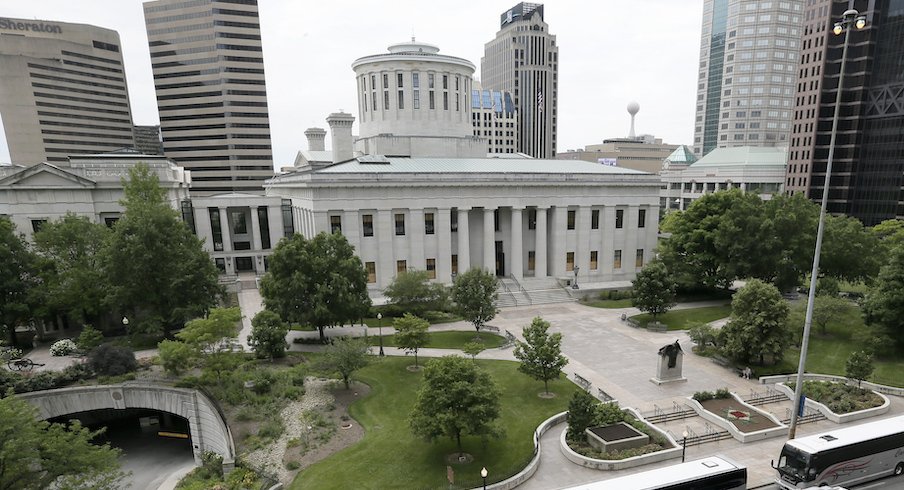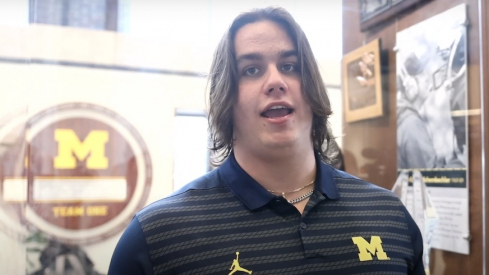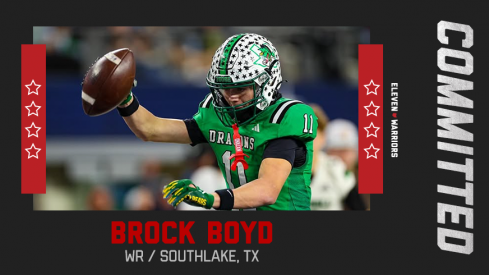Ohio has name, image and likeness legislation ready.
Pressure on the NCAA to enact rules and regulations that would allow college athletes nationwide to profit off of their name, image and likeness by July 1 continues to ramp up. Gene Smith, Ohio State's athletic director, told Eleven Warriors last week that he believes it's "going to happen" by that date. But if the NCAA is unable to pass something in the next five weeks, the state of Ohio – along with several other states – will be prepared to go forth with its own rules.
Much-anticipated legislation in Ohio is set to be introduced on Monday that would allow college athletes to make money off of their name, image and likeness beginning on July 1.
The bill is sponsored by Niraj Antani, a Republican state senator from Miamisburg. He held a press conference, along with Smith, on Monday to announce it.
"This bill will affirmatively prohibit any university or intercollegiate athletics association from preventing a student from participating in athletics or otherwise be punished if they receive compensation as a result of their name, image or likeness," Antani said. "It does allow them to receive professional representation, and as one of the safeguards, we require them to inform their university 15 days prior to entering into any contract. The bill, as it currently stands, has an effective date of July 1, 2021 of this year. This bill does not require schools or universities to do anything to enable name, image or likeness beneficiary opportunities for students. In the bill, also we do restrict that no student-athlete may receive a name, image or likeness compensation from marijuana, alcohol, tobacco or casinos."
Athletes will be able to have professional representation, meaning agents, to help them. Schools can't veto deals but will offer guidance and advice, Smith said.
Antani says he approached Ohio State a year and a half ago with this type of bill in mind, and since then they have been "working together hand and hand in crafting this legislation." Additionally, he thanked Youngstown State president Jim Tressel and Cleveland State president Harlan Sands for their help.
This bill would be been introduced earlier, Antani said, but the pandemic "derailed my legislative agenda." When asked a hypothetical about it not getting enough support, he didn't entertain the idea, proclaiming "I'll just say this: The bill will pass."
Smith said at the press conference that he believes Ohio's NIL bill is comparatively "less restrictive" than those crafted in other states.
"All the bills are different," Smith said. "The ones that are in effect by July 1, and actually there are some states that are looking to change their effective date to July 1. So those bills are different, everywhere from New York to Florida to California. So every environment is going to be operating differently. It's going to create a level of chaos. I'm still hopeful that the NCAA comes into play and that might mitigate it to some degree."
Ohio, up until this week, was one of fewer than a dozen states not to have an NIL bill either passed or introduced. This legislation represents a notable step to ensure that the Buckeye State won't be left behind if the NCAA fails to create nationwide rules by July 1.
If the NCAA is unable to pass something dictating NIL rules and regulations in the next five weeks, an imbalance in the nationwide landscape could be created. Five states – Alabama, Florida, Georgia, Mississippi and New Mexico – have bills passed allowing college athletes to profit from their NIL that are set to take effect on the first day of July. Texas is in line to possibly join them. Ten other states, including Michigan, have passed NIL legislation that'll take effect at later dates. Various other states are currently trying to pass legislation, and now Ohio joins them.
Smith had hinted of this possibility last week, saying the possibility of Ohio putting forth a bill is "not over yet." He's in favor of college athletes being able to make money from their name, image and likeness and believes the NCAA should already have put in place rules to allow for it to happen.
“I'm disappointed that it didn't happen in the last council meeting. I'm on the NCAA legislative solutions group,” Smith said on Thursday. “When I moved from my chair position, I moved to the legislative solutions group and we crafted the legislation that I think is good legislation that should have been passed in January. And I believe that it should have been passed this week at the council meeting. But I understand their rationale. There was concerns. I'm hopeful that it's passed in June and across the country it's opened up July 1.”


